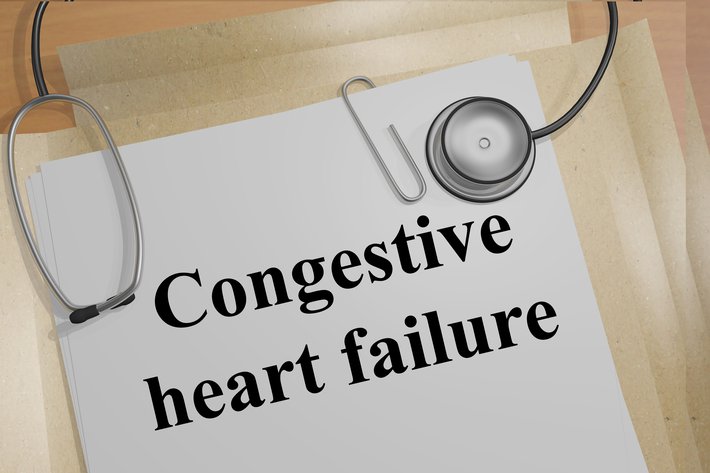Congestive Heart Failure: Definition
What is congestive heart failure? It is an illness which prevents the heart from carrying out its functions efficiently. It normally occurs when the heart begins to pump blood very slowly, which in turn affects all other bodily functions. The heart pressure increases, and as a result the heart delivers inadequate amounts of oxygen and the necessary nutrients to the rest of the body. As a response, the heart chambers may stretch to aid in the pumping, or they may thicken. In the long run, the muscles in the heart get weak and lose efficiency in pumping blood. Eventually, the lungs congest, and the body may retain sodium chloride and water, causing other organs to fail. It is commonly referred to as heart failure and its medical abbreviation is ‘CHF’.
What Causes Congestive Heart Failure?
There are numerous causes of CHF. That is why it is advisable to have regular medical checkups to ensure that you don’t have any underlying diseases that may lead to this condition.
The most common causes of CHF causes:
- Heart attacks
- A history of coronary artery disease
- Long-term alcoholism
- Hypertension
- Heart defects through birth.
Symptoms and Stages
Many people describe chest pains and difficulty breathing with CHF. While this is true, other critical heart failure symptoms should be monitored to detect the condition early. One may be busy at work or resting at home when they suddenly feel out of breath. Other signs are:
- General body weakness and fatigue
- Fast heartbeat
- Difficulty exercising
- Lung congestion
- Loss of appetite and feeling nauseous
- Frequent urge to urinate
- Weight gain due to fluid retention
- Trouble concentrating and staying alert
- Pink mucus with endless coughs
- Swelling in the abdomen
- Feet swelling.
Most people usually ask, ‘How long does a heart attack last?’ It mostly depends on the individual since it can last from 15 minutes to 30 minutes to even hours. When one experiences these symptoms, emergency medical assistance is necessary. This is a severe condition that may threaten one’s life, so the symptoms should not be ignored.
CHF normally attacks patients in stages. Below is an outline of the heart failure classes:
- Class 1
People who are prone to suffering heart failure of this class are those suffering from hypertension, diabetes, alcoholism, rheumatism, cardiomyopathy, and metabolic syndrome.
- Class 2
People who have already had heart failure before and those with a valve disease are categorized in this class. Also, those suffering from cardiomyopathy or have a history of this condition fall in this category.
- Class 3
If one experiences symptoms such as shortness of breath, difficulty exercising, and fatigue, they are in this class of CHF.
- Class 4
Patients who have undergone all the best care and treatment but are still showing severe CHF symptoms belong to class 4. At this stage, patients are considered to have chronic congestive heart failure.
Life Expectancy
Since CHF is an illness that develops progressively, it usually gets more severe as time goes by. Therefore, many people with this condition eventually die after several years of treatment and management. According to several verified medical reports, about 50% of people suffering from congestive heart failure can live for around only 5 years or less. Among those who are in the severe stages, over 90% have approximately one year of life expectancy.
Treatment
Modern medicine allows the controlling and treatment of CHF by pharmacological means. However, the CHF stage determines the best treatment for congestive heart failure. Angiotensin-converting enzyme inhibitors are medicines which aid in enhancing blood flow. Diuretic medicines are prescribed to decrease the buildup of fluids in the body, for instance, furosemide. Their primary role is to improve the heart’s efficiency in pumping blood. As much as doctors can treat and manage this condition, patients still need to consider preventive methods to ensure they lessen the risk of heart failure.
Lifestyle Changes
Prevention of CHF requires several lifestyle adjustments and sticking to healthy habits. Smoking should stop completely (and passive smoking should be avoided) as it serves as a serious contributor to CHF occurrence and re-occurrence.
Individuals with an elevated CHF risk need to ensure that they practice healthy eating and include more fruits and vegetables in their meals. The diet should also include more proteins and whole grains, and it is advisable to avoid eating too much sugar and salt. By eating a balanced diet and exercising regularly, people may increase their chances of having a normal body weight. However, if by any chance one has ever been diagnosed with CHF, they should adapt their lifestyle to healthy diet, exercise, and a proper medication regime as soon as possible to avoid exacerbating the condition. Experts from Buffalo Home Care can assist with the management of CHF and arranging comfortable everyday routines.
 English
English
 Spanish
Spanish


Comments